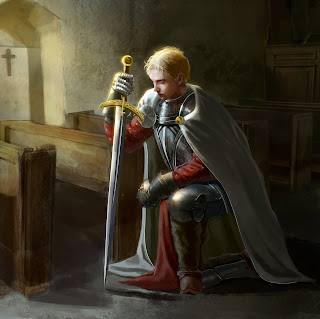So, it should come as no surprise that I love Christmas time. The whole shebang. The lights. The presents. The food. The decorations. The children who are just unabashedly excited about the whole affair. It's just magnificent and it really is magical in the most human sense. So, with that in mind, I couldn't resist what has become a trend for the past century or so: Yet another "remake" of Charles Dickens' A Christmas Carol. So without further delay, I hope you enjoy this new spell for The Hero's Journey, Second Edition.
Visitation of the Holiday Past, Present, and Yet to Come (Master)
This extraordinarily rare spell is known to only a handful of the most powerful wizards across the land and has faded into something that exists more as a myth than a real incantation. Targeting someone with a Visitation of the Holiday Past, Present and Yet to Come bends the very nature of reality itself to offer an once good and true soul a final opportunity to find redemption. This spell must be cast three times on a single target in a one hour period, once for each effect. This makes Visitation of the Holiday Past, Present, and Yet to Come impossible for all but 10th level Wizards to cast. In addition, an individual can only be the target or this spell once in their lifetime. A spellcaster making use of this spell may achieve any one of the following effects:
Visitation of Days Past: The caster selects a single target of this spell, whom they must touch when the spell is cast. This spell may only be cast on a target on the eve of Yule or other central winter celebration. The target of the spell feels no effects until they go to sleep that evening. Once the target has fallen asleep they are visited at midnight that evening by a soft-spoken and gentle spirit that appears for all intents and purposes to be a Goblin Merchant (see THJ2e, pg 171), though if any attempt to injure or attack the spirit is made it fails and the spell immediately ends. The spirit leads the target of the spell on a journey into their own past, showing them a vision of the target performing some acts of lost nobility from days gone by. The spirit then inquires with the target about these events and if, during that roleplaying, the Narrator deems the target of the spell recalls some value in these events showing the person the target used to be, then the target receives a permanent +2 bonus on all Bearing-based Saving Throws to Relax Around the Campfire, provided they have also been the target of and survived the trials of a Visitation from Days Present and a Visitation of Days to Come.
Visitation of Days Present: The caster selects a single target of this spell, whom they must touch when the spell is cast. This spell may only be cast on a target on the eve of Yule or other central winter celebration. The target of the spell feels no effects until they go to sleep that evening. Once the target has fallen asleep they are visited at around 2 AM that evening by a boisterous spirit that appears for all intents and purposes as a Fir Bolg (see THJ2e, pg 161), though if any attempt to injure or attack the spirit is made it fails the and the spell immediately ends. The spirit leads the target of the spell on a journey into the events of the Yule or winter holiday that is occurring tonight and on the morning to come. The spirit shows them the simple joys of those whom the target has dismissed as unworthy of compassion. The spirit then inquires with the target about these events and if, during the roleplaying, the Narrator deems that the target of the spell recalls the value of these once dismissed people bring to the world and the lives of those around them then the target gains the Yeoman’s Archetype Promise ability as a 1st-level Yeoman permanently, though it can only be used in relation to those featured in this vision provided by the spirit and if the target has already been targeted and passed the trials of a Visitation of Days Past or Visitation of Days Yet to Come. Yeomans targeted by this spell increase the bonus granted by their Promise ability by +1 when it is used in relation to those seen in a vision granted by Visitation of Days Present.



.jpg)





.jpg)

